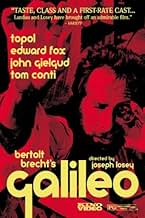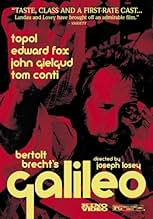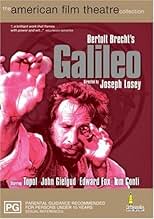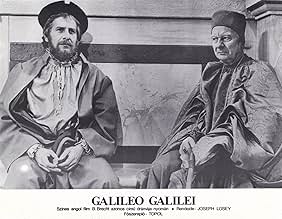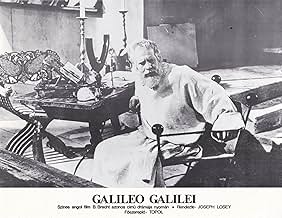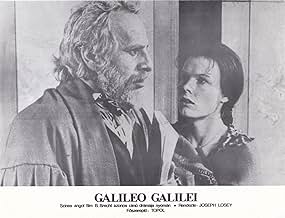Füge eine Handlung in deiner Sprache hinzuGalileo Galilei, his telescopic discoveries, support of Copernican theory, conflict with Catholic Church leading to imprisonment, and influence on future scientists like Newton and Kepler.Galileo Galilei, his telescopic discoveries, support of Copernican theory, conflict with Catholic Church leading to imprisonment, and influence on future scientists like Newton and Kepler.Galileo Galilei, his telescopic discoveries, support of Copernican theory, conflict with Catholic Church leading to imprisonment, and influence on future scientists like Newton and Kepler.
Empfohlene Bewertungen
The role of Galileo was played an interesting actor by the name of Topol. New to this generation's work, I wasn't sure who Topol was until I watched this film. For those of you who do not know, he is a mix between an insane street urchin and a bearded John Belushi. His actions in this film seemed random and rabid at the same time. I never knew what he was going to do or say next, half due to the poor quality in sound, but also because Topol never looked scripted. I guess this is a good thing because it gave some realism to the scene, but it destroyed his character. I kept seeing Galileo as insane instead of brilliant. I know some will argue that Galileo was insane, but when I read about him I just couldn't picture him as one of those screwball geniuses. I always felt he was the real deal, just misunderstood. Topol's delivery of Galileo is longwinded in the sense that he talks more about his actions than just doing them. There seemed to be a lot of this going around in the film, but I will get into that later. Honestly, I wasn't impressed with Topol's performance in this film. I need to see him in more before I make my final decision on his acting ability, but Galileo was not his cup of tea. Outside of Topol, I didn't care about any of the other characters or really fully understand who they were. The lack of character development (odd in a three hour film) and poor sound (outside of the singing kids) only pulled me further away from the rest of the cast. They were just not up to quality standards.
While researching this film, I read by another reviewer about the reasoning for the American Film Theater to make this style of movie. In the mid 70s the organization released several of their plays to the silver screen for their members. As a chance to capture more people to their plays, they offered these subscriptions with six tickets to other films that they had released. The strange aspect about these movies is that they are not filmed as if the actors are on a stage, nor do they carry a lavish budget. They use some fancy (for the time) camera work to highlight some emotions in the characters, but that is it. The rest is cheap and claustrophobic scenery that would immediately turn the novice moviegoer away. Perhaps during this era this was considered amazing cinematography and set design, but in my eyes it just seems shoddy and poor. For this film to work well there needed to be less conversation, more involvement by other characters, and less singing. I didn't see this film labeled as a musical (and I understand why the kids sang to help guide the audience throughout the film as in a play), so I didn't need the twenty minute sexually driven dance sequence in the middle. It was as if it was put in there for the men in the audience that had patiently been waiting through this film (forcing their eyes to remain open) as an added benefit. Suddenly everyone was awake, just in time for the second act. GRRRRRRR.
Overall, this film put me to sleep several times before it was over. It was not the biography I was hoping for on this acclaimed scientist. As a period piece film it failed and as a 'courtroom drama' it failed as well. The actors seemed like they were overacting for film because they were used to the theater productions. Infants did the camera work and the singing kids who introduced the scenes should have been put out of their misery. At least wait till someone has hit puberty to get them singing! Jeesh. If the American Theater wanted this to attract others to their productions, they should have filmed it on a stage, it would have created a better atmosphere and tone. Topol, I hope to see you in better down the road, but until then, stay far away from science.
Grade: * out of *****
This is like a play or at least a staged film. There are those three singing boys introducing each section. After all, it is based on a play. The story unfolds episodically in nature. Some of this may be educational. The general story is familiar to me. This British film is filled with solid actors, but the tension isn't very high.
Brecht kind of, sort of made his case for HUAC as he went back to East Germany where he was acclaimed a cultural icon. Joe Losey took off for Great Britain where he worked for the most part until his death.
You can see why the mossbacks of HUAC thought Galileo by Brecht was highly subversive stuff. Question church authority and by implication the state because religion was established. No more so than in Italy and its many Catholic city/states.
Galileo Galilei scientist/engineer was a popular well respected fellow who got a hold of a spyglass invented by the Dutchman Hans Lippershey and saw the possibilities for it in astronomy. Already a believer in the theory advanced by Copernicus about the sun being a center of the universe. The telescope allowed Galileo to observe and make more findings. If the Earth is the center of things than what are those bodies orbiting Jupiter for instance?
The Roman Catholic now engaged in a counter attack against all that Protestant type heresy took a dim view of this stuff. Galileo got vigorously questioned for these theories.
Israeli actor Topol plays the bluff and hearty Galileo. He's a man used to his creature comforts and not built for martyrdom as is shown in the play.
The fine cast Losey assembles includes Clive Revill and Georgia Brown as cabaret singers, Michael Lonsdale as Pope Urban, and Edward Fox as the Cardinal Inquisitor. John Gielgud has a great cameo as a cardinal who is beside himself with indignation that anyone would question the workings of the universe, their universe.
Galileo's epitaph despite his failure to martyr himself is the best of all. No amount of proclamations from the state or the pulpit will change the way the universe works.
That IS subversive stuff.
An exception cast has been pulled together to tell the story and it is an absorbing tale, essentially delivered as a play with no exterior shots to be seen. The cast are universally good, although, I was never entirely convinced by Topol in the lead.
Wusstest du schon
- WissenswertesJoseph Losey had also directed the original Broadway production of "Galileo," 28 years previously.
- PatzerAfter the crier announces Galileo Galilei's recantation, a chessboard is seen on the left side of the screen: all the pieces are upright. As Galileo enters, a new shot shows that one of the pieces has been toppled. In the next shot, all the pieces are again upright (1:57:50-1:58:10).
- Zitate
Andrea Sarti: [upon Galileo's recantation] Unhappy is the land that has no heroes.
Galileo Galilei: Incorrect. Unhappy is the land that *needs* a hero.
- VerbindungenFeatured in Zomergasten: Folge #23.1 (2010)
Top-Auswahl
- How long is Galileo?Powered by Alexa
Details
- Erscheinungsdatum
- Herkunftsländer
- Sprache
- Auch bekannt als
- Galileo Galilei
- Drehorte
- Produktionsfirmen
- Weitere beteiligte Unternehmen bei IMDbPro anzeigen
- Laufzeit
- 2 Std. 25 Min.(145 min)
- Sound-Mix
- Seitenverhältnis
- 1.85 : 1


